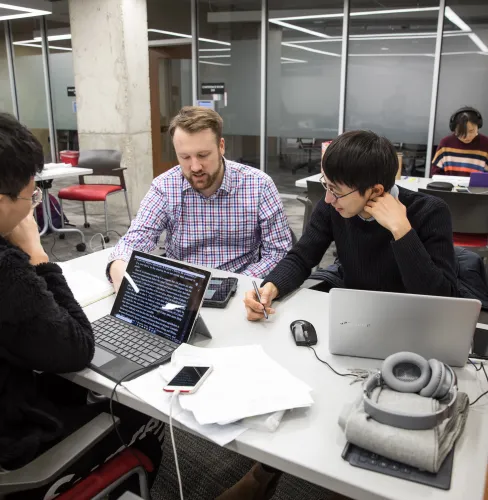GRO Academy helps build the confidence and skills to lead interdisciplinary research teams.
Tackling complex societal challenges requires researchers to learn new ways to collaborate that integrate multiple disciplinary approaches. The Growing Research Opportunities (GRO) Academy is a free, eight-week, in-person professional development program for faculty across disciplines.
Supporting new or experienced interdisciplinary research leaders, GRO Academy is rooted in team science principles that will help participants develop their personal research leadership approach, implement tools and strategies for interdisciplinary research management, and create open team research environments.
Faculty (any rank, any campus) who are interested in leading interdisciplinary research teams should apply. Self-nominations, regardless of prior experience leading or working on interdisciplinary research, are welcomed. Mid-career faculty are especially encouraged to apply.
Program Benefits
Researchers chosen for the GRO Academy will:
- be recognized as a research leader at Ohio State and designated as a GRO Fellow.
- gain self-knowledge, learn about leadership and team science principles, and develop practical skills that can be used right away.
- grow networks through interactions with fellow cohort members, GRO Academy alumni, facilitators from across campus and national experts, and ERIK staff during this experience and after.
Application and Cohort Selection
To apply, prepare a 3 to 4-page document consisting of a short CV and a personal statement. Please also include a headshot and bio (200 words max) to be publicly distributed if selected as a 2025 GRO Research Leadership Fellow. Applications are due Friday, December 6, 2024 at 5 p.m.
Applications must include:
- A cover sheet with name, title/rank, email, department and college (not included in page limit).
- A brief CV or biosketch (≈2 pages, can be a previously used biosketch).
- A 1 to 2-page personal statement, discussing:
- how GRO Academy participation in will help achieve your long-term research goals and contribute to interdisciplinary research in the context of your field;
- your prior experiences (positive or negative) working as part of a collaborative team, including the nature and purpose of the team and your role within the collaboration; and
- a description of your research plan/goals for the next 3-5 years, including any plans to apply for federal funding.

Application Process Details
Access the application portal and:
- Upload the combined cover page and application as: lastname, firstname_college_GROAcademy
- Upload a headshot named: lastname, firstname_college_photo
- Upload a short bio (200-word max) named: lastname, firstname_college_bio
Program Structure
The 2025 GRO Academy runs from February 14 - April 11 and is comprised of approximately 30 hours of program participation, including:
- A half-day, in-person, kickoff retreat at the STEAM Factory (Friday, February 14)
- Seven two-hour, in-person sessions on main campus held on Fridays from 2 - 4 p.m., from February 21 through April 11 (excluding spring break)
- Seven one-hour-long intersession small group discussions held over Zoom at mutually agreeable times on either Tuesdays or Wednesdays each week
The Friday sessions are highly interactive and will support knowledge development with active exercises and practical applications. The weekly small-group sessions are held by Zoom and led by GRO Academy alumni. They will enable reflection, application and practice large-group session learnings. Topics for in-person workshops include:
- Developing your personal and team research leadership style
- Creating collaboration agreements
- Project management and strategic planning for research teams
- Handling conflict in research teams
- Creative problem-solving when leading interdisciplinary projects
Each week will require about one hour of pre-work. Depending on the topic, this may include short readings, self-assessments, videos or case studies. Over the eight-week program, participants will also develop a three- to five-year research leadership plan.